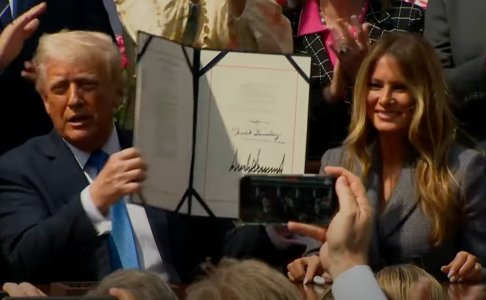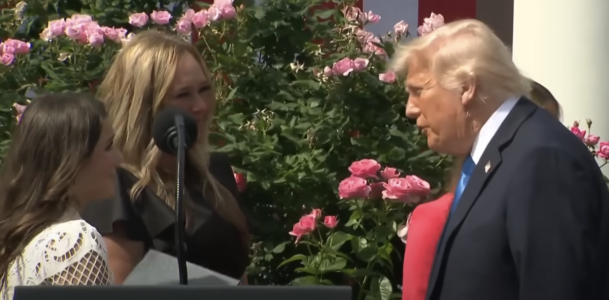Melania Trump quietly makes history with surprising role in new online safety law
By
Veronica E.
- Replies 7
A quiet gesture in the White House Rose Garden is making headlines—not just because of what was signed, but who signed it.
In a rare and unprecedented move, First Lady Melania Trump added her signature next to her husband’s on the Take It Down Act, a bill designed to protect victims of online exploitation.
While First Ladies have long championed social causes, it’s nearly unheard of for one to officially sign a piece of legislation.
Melania’s signature wasn’t just symbolic.
It reflected months of personal outreach, Capitol Hill lobbying, and what the White House called “tireless dedication” to getting the bill passed.
And for many watching, the moment marked a new kind of visibility—and power—for the modern First Lady.

Traditionally, only the President signs bills into law.
But after President Trump signed the Take It Down Act on Monday, he handed the binder to Melania and said, “Honey, you’ve done amazing.”
She smiled, picked up a white pen, and made history with a flourish.
“I said, it sounds like a tough one—and yet a very important one—and you got it done. So I congratulate you,” the President added.
Later, he joked about a phone call with Russian President Vladimir Putin, saying, “Putin just said they respect your wife a lot. I said, ‘What about me?’ They like Melania better.”
Melania spoke first at the Rose Garden ceremony—an unusual lead role for a First Lady.
She called the new law a “national victory that will help parents and families protect children from online exploitation.”
“This legislation is a powerful step forward in our efforts to ensure that every American, especially young people, can feel better protected from their image or identity being abused,” she said.
She didn’t shy away from warning about modern technology either, calling social media and AI “digital candy for the next generation.”
“Sweet, addictive, and engineered to have an impact on the cognitive development of our children,” she explained.
“But unlike sugar, these new technologies can be weaponized, shape beliefs, and sadly affect emotions—and even be deadly.”
The Take It Down Act increases protections for victims of non-consensual sexual image sharing, often referred to as revenge pornography.
The law also includes AI-generated content, such as deepfake porn.
Under the law, websites must make a reasonable effort to remove such images within 48 hours of a formal complaint.
This act is also the first major legislative victory tied to Melania’s revived “Be Best” campaign, which now focuses heavily on safeguarding children from digital threats.
One aspect of the bill that stood out was its strong bipartisan support.
Sponsored by Senator Ted Cruz and Representative Maria Salazar, the law passed with backing from both Republicans and Democrats—something increasingly rare in today’s political climate.
“Thank you all for coming together to prioritize people over politics,” Melania said during her remarks.
President Trump added a light comment to Melania, saying, “I’m not even sure you realize, honey, you know a lot of the Democrats and Republicans don’t get along.”
Melania made several trips to Capitol Hill this year to advocate for the bill, even joining Senator Cruz at a roundtable event in March.
She also invited survivors of online abuse to share their stories—including Francesca Mani and Elliston Berry, who were both in the Rose Garden audience during the signing.
Berry, now 15, bravely spoke out about her experience as a victim of AI-generated deepfake pornography.
She testified, “I was 14 years old when I was violated all over social media.”
A classmate had altered one of her photos using AI to make it appear nude.
“I came here today to not only promote this bill but to fight for the many survivors. It is so inspiring to know that my voice is being heard... It is truly so amazing how this awful situation has turned to good,” she said.
Melania’s visible involvement—from lobbying lawmakers to sharing the stage during a bill signing—raises important questions about how the role of First Lady might evolve in the future.
Could more First Ladies take on formal legislative roles?
White House communications staff say she’s just getting started.
“Moving forward, she will continue to champion the well-being of our nation’s children through her Be Best agenda,” said spokesperson Karoline Leavitt.
While these digital threats often target teens, older adults aren’t immune.
Many didn’t grow up with the internet, making it harder to navigate today’s digital risks.
But Melania’s efforts—and the stories of brave young survivors—underscore the importance of staying informed and getting involved, no matter your age.
Read next: Harvard risks billions by refusing Trump administration’s latest move

What do you think about Melania’s involvement in this legislation? Do you believe First Ladies should take a more active role in shaping policy? Has your family been affected by online harm? We’d love to hear your thoughts and experiences in the comments.
In a rare and unprecedented move, First Lady Melania Trump added her signature next to her husband’s on the Take It Down Act, a bill designed to protect victims of online exploitation.
While First Ladies have long championed social causes, it’s nearly unheard of for one to officially sign a piece of legislation.
Melania’s signature wasn’t just symbolic.
It reflected months of personal outreach, Capitol Hill lobbying, and what the White House called “tireless dedication” to getting the bill passed.
And for many watching, the moment marked a new kind of visibility—and power—for the modern First Lady.

First Lady Melania Trump joins President Donald Trump in the White House Rose Garden after signing the Take It Down Act. Image Source: YouTube / Fox News.
A different kind of bill signing
Traditionally, only the President signs bills into law.
But after President Trump signed the Take It Down Act on Monday, he handed the binder to Melania and said, “Honey, you’ve done amazing.”
She smiled, picked up a white pen, and made history with a flourish.
“I said, it sounds like a tough one—and yet a very important one—and you got it done. So I congratulate you,” the President added.
Later, he joked about a phone call with Russian President Vladimir Putin, saying, “Putin just said they respect your wife a lot. I said, ‘What about me?’ They like Melania better.”
Also read: FDA under fire for withholding outbreak details—Here’s why it matters.
Melania steps into the spotlight
Melania spoke first at the Rose Garden ceremony—an unusual lead role for a First Lady.
She called the new law a “national victory that will help parents and families protect children from online exploitation.”
“This legislation is a powerful step forward in our efforts to ensure that every American, especially young people, can feel better protected from their image or identity being abused,” she said.
She didn’t shy away from warning about modern technology either, calling social media and AI “digital candy for the next generation.”
“Sweet, addictive, and engineered to have an impact on the cognitive development of our children,” she explained.
“But unlike sugar, these new technologies can be weaponized, shape beliefs, and sadly affect emotions—and even be deadly.”
Also read: Joe Biden’s recent health concern might not be so small after all—Doctors reveal a new aggressive diagnosis
What the Take It Down Act does
The Take It Down Act increases protections for victims of non-consensual sexual image sharing, often referred to as revenge pornography.
The law also includes AI-generated content, such as deepfake porn.
Under the law, websites must make a reasonable effort to remove such images within 48 hours of a formal complaint.
This act is also the first major legislative victory tied to Melania’s revived “Be Best” campaign, which now focuses heavily on safeguarding children from digital threats.
A bipartisan victory
One aspect of the bill that stood out was its strong bipartisan support.
Sponsored by Senator Ted Cruz and Representative Maria Salazar, the law passed with backing from both Republicans and Democrats—something increasingly rare in today’s political climate.
“Thank you all for coming together to prioritize people over politics,” Melania said during her remarks.
President Trump added a light comment to Melania, saying, “I’m not even sure you realize, honey, you know a lot of the Democrats and Republicans don’t get along.”
Also read: "I never heard of you": Trump shocks reporter during oval office sit-down
Faces behind the cause
Melania made several trips to Capitol Hill this year to advocate for the bill, even joining Senator Cruz at a roundtable event in March.
She also invited survivors of online abuse to share their stories—including Francesca Mani and Elliston Berry, who were both in the Rose Garden audience during the signing.
Berry, now 15, bravely spoke out about her experience as a victim of AI-generated deepfake pornography.
She testified, “I was 14 years old when I was violated all over social media.”
A classmate had altered one of her photos using AI to make it appear nude.
“I came here today to not only promote this bill but to fight for the many survivors. It is so inspiring to know that my voice is being heard... It is truly so amazing how this awful situation has turned to good,” she said.
A new chapter for the First Lady’s role?
Melania’s visible involvement—from lobbying lawmakers to sharing the stage during a bill signing—raises important questions about how the role of First Lady might evolve in the future.
Could more First Ladies take on formal legislative roles?
White House communications staff say she’s just getting started.
“Moving forward, she will continue to champion the well-being of our nation’s children through her Be Best agenda,” said spokesperson Karoline Leavitt.
Also read: Law and order? Why Trump thinks Alcatraz deserves a comeback
How you can protect yourself and your family
- Stay informed: Learn to recognize the risks of online image exploitation and deepfake content.
- Start the conversation: Talk to children and grandchildren about internet safety and consent.
- Know your rights: Under the new law, victims can file complaints and require websites to remove harmful content within 48 hours.
- Support awareness: Consider backing organizations that fight online abuse and promote digital literacy.
While these digital threats often target teens, older adults aren’t immune.
Many didn’t grow up with the internet, making it harder to navigate today’s digital risks.
But Melania’s efforts—and the stories of brave young survivors—underscore the importance of staying informed and getting involved, no matter your age.
Read next: Harvard risks billions by refusing Trump administration’s latest move
Key Takeaways
- Melania Trump made history by signing the Take It Down Act alongside President Donald Trump—marking the first time a US First Lady has added her signature to legislation.
- The Take It Down Act strengthens protections for victims of revenge porn, including AI-generated deepfake content, and requires websites to remove such material within 48 hours of a complaint.
- Melania actively lobbied for the bill, meeting with lawmakers and survivors, speaking at Capitol Hill events, and describing the legislation as a "national victory" that protects children and families from online exploitation.
- The law was sponsored by Sen. Ted Cruz and Rep. Maria Salazar and passed with strong bipartisan support—something Melania praised during the signing ceremony.
- The First Lady also revived her Be Best campaign earlier this year, with the act becoming its first major legislative win during her second term.
- Survivors Francesca Mani and Elliston Berry—who testified about her own deepfake abuse at age 14—were present during the Rose Garden ceremony and personally recognized by the President.
- Melania criticized social media and AI as "digital candy" engineered to influence young minds and warned that, unlike sugar, such technologies can be weaponized and even be deadly.
What do you think about Melania’s involvement in this legislation? Do you believe First Ladies should take a more active role in shaping policy? Has your family been affected by online harm? We’d love to hear your thoughts and experiences in the comments.







